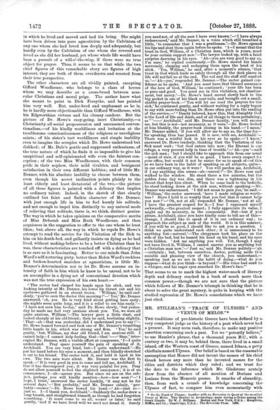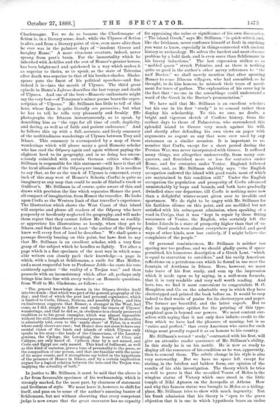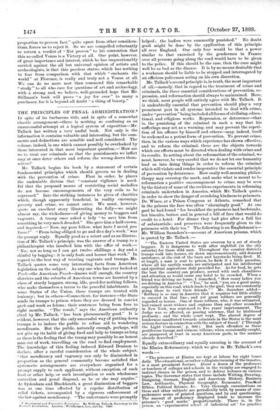MR. STILLMA.N'S "TRACK OF ULYSSES" AND. "VENUS OF MELOS."*
THE traditions of pre-historic Greece have been defined by a. very competent judge as the history of a past which never had a present. It may seem rash, therefore, to make any positive- assertion concerning such a past. Yet we "potently believe," to use Hamlet's phrase, that a thousand years B.C., with a. century or two, it may be, behind them, there lived in a small island, off the Western coast of Greece, named Ithaca, a petty chieftain named Ulysses. Our belief is based on the reasonable. assumption that Homer did not invent the names of his chief. Greek heroes any more than he invented names for the. cities and districts which they ruled ; and we trust for- the date to the inference which Mr. Gladstone acutely- drew from the absence of all mention of Dorians and Ionians from the 'Homeric poems. It smacks of absurdity,. then, from such a crumb of knowledge concerning the. Ulysses of fact, to compare him even momentarily with.
• On the Track of Ulysses together with an Excursion in Quest of the so-called Venus of Halos. Two Studies in Archeology, made during a Cruise among the Greek Islands. By W. J. Stillman. Boston and New York, U.S.A.: Houghton,. Mifflin, and Co. ; Cambridge, U.S.A. : The Riverside Press. ass. Charlemagne. Yet we do so because the Charlemagne of fiction is, in a literary sense, dead ; while the Ulysses of fiction is alive, and from a literary point of view, even more alive than he ever was in the palmiest days of "insolent Greece and haughty Rome." A more vivacious creature, indeed, never sprang from poet's brain. For the immortality which he inherited with Achilles and the rest of Homer's greater heroes, has been brightened and quickened in a way which makes it as superior to theirs, so to speak, as the state of Teiresias after death was superior to that of his brother-shades. Shake- speare puts the finest of his political speeches—and fine indeed it is—into the mouth Of Ulysses. The third great episode in Dante's Infenw describes the last voyage and death of Ulysses. And one of the best—Homeric enthusiasts might say the 1-ery best—of Tennyson's minor poems bears the super- scription of "Ulysses." Mr. Stillman has little to tell of this hero, whose fame is quite literally are perennius ; but what he has to tell, he tells very pleasantly and freshly. He photographs the Ithacan instantaneously, so to speak, by describing him as the type for all time of craft, duplicity, and daring, as well as of faith and patient endurance." And he follows this up with a full, accurate, and lively summary of the multitudinous wanderings of •Ulysses between Troy and Ithaca. This summary is accompanied by a map of those wanderings which will please many a good Homeric scholar who has read the Odyssey again and again without paying the slightest heed to its geography, and in so doing has uncon- sciously coincided with certain German critics who—Mr. Stillman is responsible for this statement—will have it that all the local allusions of the Odyssey are imaginary. It is needless to say that, so far as the track of Ulysses is concerned, every inch of this map west of Homer's Scheria (Corfu) is quite as imaginary as any map that could be made of Sinbad's track or Gulliver's. Mr. Stillman is, of course, quite aware of this, and draws with precision the line which separates Homer the poet, all compact of imagination, from Homer the traveller. He looks upon Corfu as the Western limit of that traveller's experience. The illustration which shows the West Coast of that island will surprise and please all readers of the Odyssey who have purposely or heedlessly neglected its geography, and will make them regret that they cannot follow Mr. Stillman so readily, or appreciate his illustrations so keenly, when they get to Ithaca, and find that there at least the author of the Odyssey knew well every foot of land he describes." We shall quote a passage directly bearing on this point, but have first to say that Mr. Stillman is an excellent scholar, with a very firm grasp of the subject which he handles so lightly. Yet after a page which is a fine specimen of the neat way in which some able writers can closely pack their knowledge—a page in which, with a laugh at Schliemann, a smile for Max Muller, and a most respectful bow to Professor Jebb—he casts his vote cautiously against "the reality of a Trojan war," and then proceeds with an inconsistency which, after all, perhaps only brings him into line with every writer on Homeric questions, from Wolf to Mr. Gladstone, as follows :— "The general knowledge shown in the Odyssey divides itself into two kinds : that which was part of the general geography of the day ; and that of which the poet had personal cognizance, which is limited to Corfu, Ithaca, Nericus, and possibly Pylos ; and this exclusiveness suggests that Homer, a stranger in the West, had come, as I did, simply to follow and study the traces of Ulysses' wanderings, and that he did so, in obedience to a clearly preserved tradition as to his great exemplar, which was almost impossible without the still remembered personal presence. What he describes is admirably told, even to the sandy shore' of Pylos, in a world whose sandy shores are rare ; but Homer does not seem to have any mental vision of the lands and islands of which Ulysses only speaks in his story—the lands of the Cimmerians, of the Laestry- gonians, the Cyclops, the Lotophagi, the homes of Circe and Calypso, are only heard of. Cythera close by is not named, and Crete and Egypt are only named. This kind of fufilment, as well as this kind of omission, gives a tone of personality to the poem, as the composition of one person, and that one familiar with the scene -of its major events, and it strengthens my belief in the hypothesis of the presence of Homer in Ithaca, and by a certain implication argues for a logical relation between the hero and the Trojan war, implying the actuality of both."
In justice to Mr. Stillman, it must be said that the above is a far from favourable specimen of his workmanship, which is strongly marked, for the most part, by clearness of statement and liveliness of style. We must leave it, however, to shift for itself, and pass on to some of the author's amusing banter of Schliemarm, but not without observing that every competent judge is now aware that the great excavator has no Capacity for appraising the value or significance of his own discoveries. "The island Greek," says Mr. Stillman, "is quick-witted, and, like the Irishman, never confesses himself at fault in anything you want to know, especially in things connected with ancient history or archEeology. He solves the hardest and most obscure problem by a bold dash, and is even surer than Schliemann in his breezy inductions." The last expression strikes us as " mobled queen" struck Polonius, and as there is nothing quite so good in the author's other merry references to "the nalf Doctor," we shall merely mention that after spouting Homer to some Ithacan villagers, who had assembled, as he thought, to do him honour, he mistook their tears of merri- ment for tears of pathos. The explanation of his error lay in the fact that "no one in the assemblage could understand a word of the Greek in the Doctor's pronunciation."
We have said that Mr. Stillman is an excellent scholar; but his cue in his first " study " is to conceal rather than display his scholarship. To this we owe, no doubt, a bright and vigorous sketch of Corfiote . history, from the earliest days to those of Palmerston, who surrendered this splendid island to Greece very much against his will, and shortly after defending his own views on paper with arguments as cogent as any that were ever used by any statesman on a similar occasion. It is important to re- member that Corfu, except for a short period during the Persian War, was never incorporated with Greece. It suffered many things, not altogether undeservedly, from many con- querors, and flourished more or less for centuries under Rome, and for centuries under Venice. England followed Venice, and, as Mr. Stillman shabbily says, "the English occupation endowed the island with good roads, most of which are maintained in fair condition still." Under the English occupation the population and prosperity of Corfu advanced unmistakably by leaps and bounds, and both have gradually dwindled since our departure, till Corfu is nothing more now than a delightful winter-resort given over to invalids and sportsmen. We do right to be angry with Mr Stillman for his faithless silence on this point, and are mollified but not satisfied with his subsequent admission, when speaking of a road in Cerigo. , that it was "kept in repair by those fitting successors of Venice, the English, who certainly left the Ionian Islands in a state of prosperity higher than that of to- day. Good roads were almost everywhere provided, and good ways of other kinds, now lost entirely, if I might believe the complaints of the people."
Of personal reminiscences, Mr. Stillman is neither too sparing nor too profuse, and we should gladly quote, if space permitted, his humorous description of a Greek Lent, "which is equal to starvation to outsiders," and his racily American reflections on a petroleum-can which he found in use near the fountain of Arethusa in Ithaca. Here, however, we must take leave of his first study, and sum up the impression which it made upon us by saying, in a well-worn formula, that it is very readable and very well worth reading. And here, too, we find it most convenient to congratulate H. 0. Houghton and Co. on the admirable way in which they have electrotyped and printed the book before us. It would be easy indeed to find words of praise for its electrotypes and paper. The former are beautiful, and the latter superb. But to " find an appropriate epithet for the printing of this typo- graphical gem is beyond our powers. We must content our- selves with saying that it not only does infinite credit to the firm which we have had the pleasure of naming, but is so "entire and perfect," that every American who cares for such things must proudly regard it as an honour to his country.
Mr. Stillman's second "study," contrasted with his first, will give an attentive reader assurance of Mr. Stillman's ability. In this study he is on his mettle. He is now as ready to display all the resources of his erudition as he was, apparently, then to conceal them. The subtle change in his style is also very noteworthy. But we have no space left except for stating, in the briefest and baldest form, our opinion of the results of his able investigation. The theory which he tries so well to prove is that the so-called Venus of Melos is the wingless statue of Victory which once stood in the little temple of Nike' Apteros on the Acropolis at Athens. How and why this famous statue was brought to Melos as a hiding- place, Mr. Stillman tries to show with much ingenuity: But his frank admission that his theory is "open to the grave objection that it is one in which hypothesis bears an undue
proportion to proven fact," quite apart from other considera- tions, forces us to reject it. So we are compelled reluctantly to return a verdict of "Not proven" to his contention that this so-called Venus is a Victory at all. One point, however, of great importance and interest, which he has unquestionably carried against the all but universal opinion of artists and arclneologists, is that this peerless statue, which has nothing to fear from comparison with that which "enchants the world" at Florence, is really and truly not a Venus at all. We can do no more now than commend this remarkable " study " to all who care for questions of art and archaeology, with a strong and, we believe, well-grounded hope that Mr. Stillman's book will prove "a joy for ever" to many a purchaser, for it is beyond all doubt "a thing of beauty."








































 Previous page
Previous page